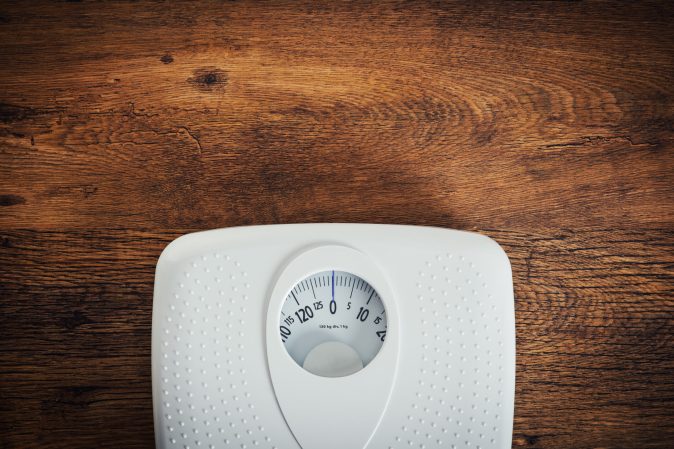

In March, as states began to open COVID-19 vaccine eligibility to people with pre-existing health conditions, a large group of people realized that they qualified for the vaccine by virtue of their height and weight alone. According to the Centers for Disease Control and Prevention (CDC), anyone with a body-mass index (BMI) above 25 (what the CDC considers as “overweight”) is technically at risk of severe COVID-19. Even more at risk, according to the CDC, are those with BMIs above 30—the “obese” category. These categories describe 74 percent and 43 percent of the country, respectively.
In a medical system where people with higher weights experience discrimination on a regular basis, getting the vaccine early was a rare and welcome perk. But experts in weight stigma say that there are problems associated with labeling obesity as a risk factor for COVID-19. Not only is it impossible to conclude that high BMI directly causes worse COVID-19 outcomes—to do so is actively harmful to the health of people living in bigger bodies.
BMI is a fairly simple measurement that considers the relationship between two factors: weight and height. To get yours, take your weight (in kilograms) and divide it by the square of your height (in meters). The origin of the BMI is also quite old. Adolphe Quetelet, a belgian astronomer, mathematician, and sociologist, developed the quantification 190 years ago as part of his larger effort to document the dimensions of “the average man.” Over a century later, epidemiologists stumbled upon Quetelet’s ratio and decided that it worked as a proxy for body fat—and therefore for health.
However, “it was never intended as an individual marker of health,” says Gregory Dodell, an endocrinologist at a private practice, Central Park Endocrinology, in New York City. On top of that, Quetlet’s data was also extremely limited: It was based solely on the measurements of white, European men. “So you’re obviously excluding a wide range of people from different genetic backgrounds and different ethnicities.”
In today’s times, it’s taken as a given, both in the medical community and in popular culture, that to be fat and live with a higher BMI is to be unhealthy. In 2013, the American Medical Association formally recognized obesity as a disease. But in doing so, they went against their scientific advisory board, The Council for Scientific Affairs, which cited “a lack of characteristic signs or symptoms due to obesity” and insufficient “evidence of any true causal relationships between obesity and morbidity and/or mortality.” (It’s important to note that the terms “obesity” and “obese” are widely seen by fat activists and academics studying weight stigma as highly stigmatizing. The terms “fat” and “higher weight”—which can often be less loaded, more objective descriptors—are preferred.)
Medical professionals argue that higher BMI is associated with a myriad of conditions including diabetes, high blood pressure, and heart disease—ailments that put people at risk of severe COVID-19.
A body of literature, though, including long term studies with a large numbers of participants, challenges that association. In one noteworthy study, over a span of nineteen years, scientists studied the health of 14,685 participants, sorting them into “healthy” and “unhealthy” groups based on their blood sugar, cholesterol and triglycerides, as well as blood pressure. Their results, published in 2015 in the journal Obesity, found that BMI had no impact on whether participants developed heart disease or stroke, or on their overall mortality. It did have a slight impact on diabetes risk, but only among people whose blood sugar, cholesterol, and blood pressure put them in the “healthy” category— and that effect was small. Even though, on average, participants gained weight throughout the nearly two-decades long study, the measures of health didn’t change among individuals. Another study, published in JAMA in 2016, studied mortality among 2.88 million participants across five continents and found that people in the “obese” BMI category had a similar risk of death compared to people in the “normal” category, while people in the “overweight” BMI category had a lower risk of death compared to those in the “normal” BMI category.
[Read more: The truth about counting calories]
The connection between BMI and COVID-19 risk is also murky and unsettled. A number of studies suggest that people with higher BMIs have a higher risk of getting admitted to the ICU with COVID, needing a ventilator to survive, or dying of the disease. Some doctors point out that just having a bigger body can make it more difficult to be treated for COVID-19. A larger chest might make it harder to breathe, for instance, and ventilators were designed for smaller bodies, despite the fact that the majority of Americans live in larger ones.
Much of the research on the association between BMI and COVID-19 include relatively small groups of participants, and don’t account for factors like socio-economic status or quality of care—both of which impact COVID-19 risk, says Paula Brochu a social psychologist studying prejudice and stigma at Nova Southeastern University Florida. The evidence we have is not enough to make a sweeping claim, and “research findings in this area are mixed and contradictory,” she wrote in an email. A larger study of more than 10,000 veterans, published last September in JAMA Network Open, found that BMI was not associated with worse COVID-19 outcomes and a study of nearly 7,000 people published in the Annals of Internal Medicine found that only male patients with BMIs higher than 40 (which represents less than eight percent of the population in the United States) had worse outcomes.
“This is a rapidly evolving area of research, and so I think a bit of caution is warranted, settling on weight as a risk factor,” says Jeffrey Hunger, a social and health psychologist at Miami University studying weight stigma. “At the end of the day, once we are post pandemic and all the data are in, we might see this correlation between weight status and COVID risk.” But prematurely making that conclusion could actively do harm to people with bigger bodies, he added.
Research suggests that weight stigma—experiencing discrimination based on body size—is itself associated with worse mental and physical health. Udo studies the impact of weight stigma on health, and she has found that people who report experiencing more weight stigma are more likely to develop arteriosclerosis, minor heart conditions, and diabetes, regardless of BMI, physical activity levels, and socioeconomic status.
[Read more: The sexy secrets of body fat storage]
You don’t need to encounter overt discrimination to experience these effects, Hunger says. Weight stigma is apparent in the way we communicate about people with higher weights, he says. And there’s been no shortage of stigmatizing language and imagery during the COVID-19 pandemic. Hunger cites the stock images of faceless fat people in ill-fitting clothes that often accompany articles about COVID-19 risk and “obesity,” hand-wringing over the “quarantine-15”, and op-eds that lament the pandemic weight gain alongside the increase in alcoholism.
“Implicit in this discussion of weight as a risk factor is this idea that fat people deserve worse outcomes from COVID, because they’ve brought it on themselves,” Hunger said.
For some, discrimination is more of a fear than the virus itself. Research suggests that higher BMI is associated with lower quality of medical care. The No Body is Disposable project advises fat people to create a “connection kit” in case they need to visit the hospital for COVID-19 complications and are unable to advocate for themselves. The website suggests including a “humanizing” portrait and a mini self-introduction, with phrases like “community organizer” and “someone’s child.” The idea is that medical professionals will see them as a person, not for their weight, and deliver more equitable care.
Fear of stigma can lead people to avoid medical care altogether. “I’m in a bigger body, I got COVID. So I’m saying this from experience: It’s really hard for me to get someone to take my concerns about my health really seriously,” says Marquisele Mercedes, a PhD student in critical public health at Brown University. “If something is wrong with a fat person, it’s treated as a weight problem, it’s not because of anything else.”
When we study BMI but fail to account for stigma and quality of care in our research, it leaves a hole, Hunger says. “If we don’t ever consider those factors, if we don’t ever measure them, then of course, the dominant message is going to prevail that weight is predicting COVID complications and that it’s a direct relationship.”






















